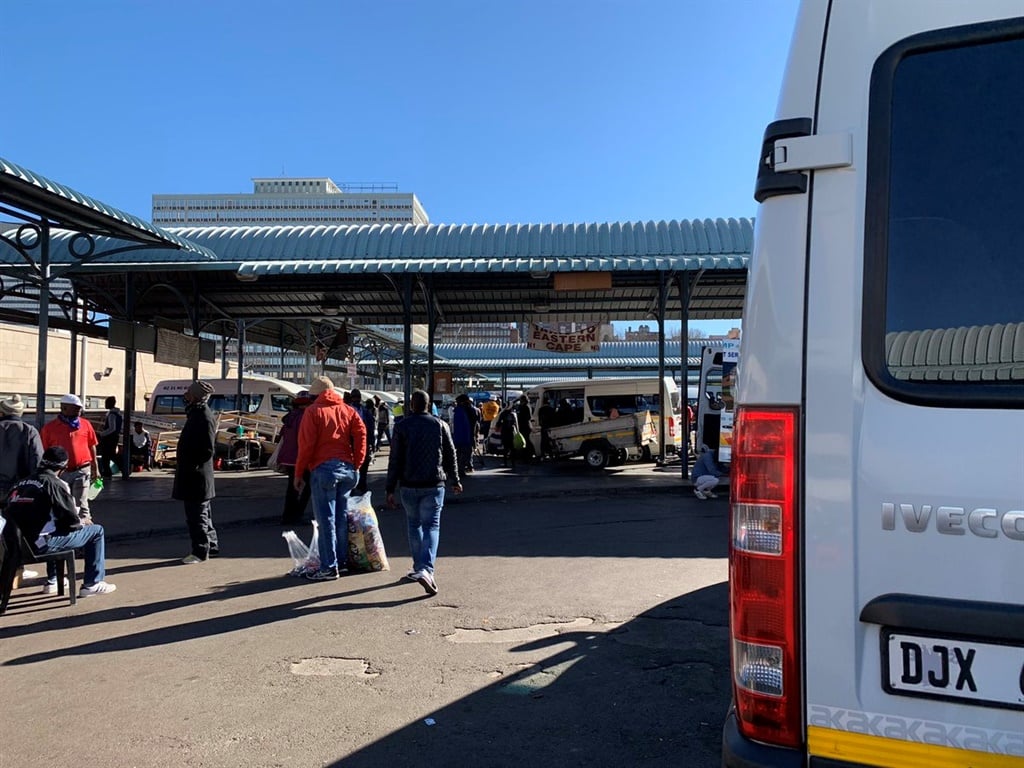


Long-distance taxis are loading at 100% capacity at the Wanderers taxi rank.
- Some taxis across South Africa started operating at
100% load capacity in contravention of the government’s regulations. - This after taxi associations repeatedly expressed
concern over the financial viability of the industry due to Covid-19
regulations. - Here is what led to taxis defying government’s
regulations.
A number of taxis started operating at 100%
capacity on Monday morning in line with associations’ call to defy government’s
70% capacity regulation in light of Covid-19.
Some taxis, however, said they
were reluctant to defy state regulations and would comply with Covid-19
protocols.
In separate virtual briefings on Sunday afternoon,
the South African National Taxi Council (Santaco) and the National Taxi
Alliance (NTA) announced the move to 100% capacity, and to travel
interprovincially.
The taxi associations’ announcement came after
Transport Minister Fikile Mbalula postponed two different meetings with them to
discuss state support and transport regulations.
Taxi associations are concerned about the financial
viability of the industry and that some operators aren’t making enough to cover
fuel costs due to the regulations.
Here’s what led to taxi associations deciding to
increase vehicle capacity to 100% despite government regulations.
Why are taxi associations calling for 100%
capacity?
Santaco national spokesperson Thabisho Molelekwa
said taxi owners across South Africa have been hard hit by the national lockdown,
raising fears that they will not be able to make their vehicle loan repayments
from 1 July, when their payment holiday period will end.
Molelekwa said operating at 70% capacity and being
barred from travelling interprovincially have severely impacted cash flows,
with some owners struggling to make enough money to cover fuel costs.
He said the situation has been compounded by the
continued increasing impounding of taxis during the lockdown.
Santaco estimates 45% of taxi owners could have
their vehicles repossessed in the next six to eight months, and the industry is
losing around R25 million per day due to Covid-19.
The NTA has said its members should increase fares
by not more than 40% due to lower load factors in light of Covid-19, and
increasing costs for personal protective gear and sanitation.
Outrage over government’s R1.135 billion relief
fund
Mbalula announced a R1.135 billion relief package for the taxi industry on
19 June – one of the largest relief packages for a single subsector
in South Africa during the pandemic.
This would amount to R5 000 per taxi, while
associations were calling for R20 000. It would also be administered by the
South African Revenue Service (SARS).
Mbalula said most sectors only received R350
million in support, and reaching the agreement with government required
extensive lobbying and convincing as funds are extremely limited.
Santaco’s Molelekwa however, described the relief
package as a “slap in the face”, and insufficient as it must be
shared between taxi operators, metered taxis and e-hailers.
The association then embarked on a shutdown of
services in Gauteng which left thousands of commuters stranded, and cases of
intimidation were reported.
Mbalula, who urged taxi associations to not shut
down, admitted the decision to avail R1.135 billion to the industry as relief
support was “too little” to compensate for the lockdown, but said
government did not have more money to give.
Cancelled meetings with minister, and the
announcement of 100% capacity
Santaco and the NTA were set to meet with Mbalula
on Wednesday, 24 June to discuss their concerns, but the meeting was postponed to Sunday for a meeting to be convened with
the National Coronavirus Command Council (NCCC).
At the time, Molelekwa said their rejection of the
relief fund and its outrage that it is administered by SARS, increasing to 100%
capacity and interprovincial travel, required consultation with the NCCC.
The minister, however, cancelled the meeting on
Sunday, with his spokesperson Ayanda Allie Payne saying a meeting of the NCCC
was only scheduled for Tuesday.
She said Mbalula did not have the power to make and
sign off on regulations called for by himself.
Speaking during the virtual briefing on Sunday
afternoon, Santaco’s president Philip Taaibosch said Mbalula’s office had not
provided any reasons why their meetings were postponed.
Taaibosch said they had decided it would be irresponsible to put the fate of the industry
in the hands of government, which continued to postpone meetings.
He said Santaco, therefore, decided that all taxis
operate at 100% capacity, and that interprovincial travel is permitted without
requiring permits from passengers, “whether the minister approves or
not”.
NTA general secretary Alpheus Mlalazi said they
were unhappy that aircraft were able to travel interprovincially, while taxis
were not, adding they viewed this as discrimination.
In a statement after the associations’
announcement, Mbalula said he had in fact engaged with industry leaders
last week and had committed to giving them an update, but had to
reschedule due to “unforeseen circumstances”.

